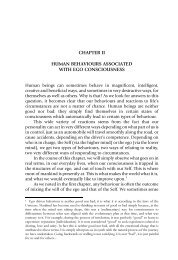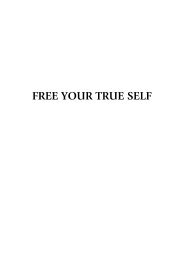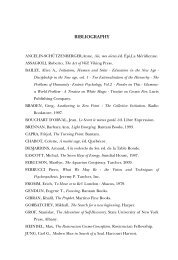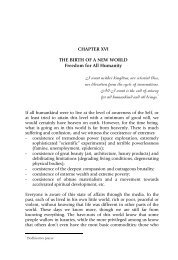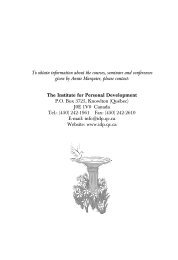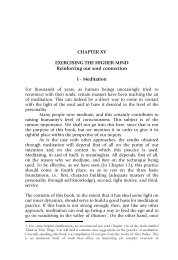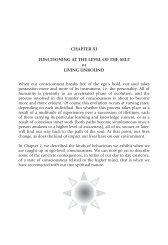INTRODUCTION
You also want an ePaper? Increase the reach of your titles
YUMPU automatically turns print PDFs into web optimized ePapers that Google loves.
<strong>INTRODUCTION</strong><br />
The Queste<br />
For thousands of years, human beings have sought to know<br />
themselves and others, and to master their environment in order to<br />
have more control over their existence. The great spiritual and<br />
philosophical traditions, and the more recent trends in psychological<br />
and scientific research, are trying to respond to this quest. With every<br />
discovery, answers are being suggested, examined, tested in the light<br />
of experience, rejected, improved upon, or broadened as the case may<br />
be. While we are still a long way from ultimate truths, humanity is<br />
progressing step by step towards a more and more elaborate<br />
understanding, i.e. mastery, of both the material world, through<br />
physical science, and the inner world, the domain of the human<br />
psyche.<br />
This quest is what motivates every facet of mankind’s constant<br />
activity. To be sure, this activity has to do with survival, but it goes<br />
beyond that. We think, we struggle, we destroy, we build, we hurt and<br />
we heal, we take and we give, we love and hate, we dream, sing, laugh<br />
and cry... Through all this, we are constantly seeking. We are looking<br />
for a way to live, for happiness, for an ideal way to dwell in this<br />
world. But these words evoke very different realities depending on<br />
who you talk to, and the means of achieving them are even more<br />
varied.<br />
In fact, this ceaseless activity is just an expression of a deeper<br />
aspiration which, if examined in a clearer perspective in terms of its<br />
ultimate goals and the means to achieve them, would point the way<br />
to such potential fulfilment that life itself would take on a whole<br />
other meaning, from an individual as well as a collective viewpoint.<br />
This inner calling can take many different forms, from the<br />
simple urge to ensure one’s physical survival, through the ordinary<br />
attitude of seeking pleasure and self-gratification, to the most<br />
involved spiritual quest. Faced with the complexity of modern life<br />
and the failure to create genuine well being through a materialistic<br />
approach, more and more people are turning their attention inward.
2 Free Your True Self<br />
They want answers to the fundamental questions that any human<br />
being must face, sooner or later, in one form or another: Who am I?<br />
Who are the people around me? Where do we come from? Where are<br />
we going? What are we doing on this planet? What is essential? What<br />
is life’s purpose?<br />
The answers to these questions vary, depending on your<br />
philosophical standpoint; but these differences ultimately stem from<br />
the fact that they are incomplete. In reality, they become consistent if<br />
examined in a broad enough perspective<br />
Some Presently Available Answers<br />
For thousands of years, mankind has been exposed to valuable<br />
spiritual teachings. Yet these teachings sometimes seem<br />
contradictory 1 . Some tell us that we are the outcome of a long<br />
spiritual evolution, yet such statements are often obscured or<br />
distorted through a limited interpretation of the original teachings.<br />
New Age schools of thought state that we are divine, but our day to<br />
day behaviour does not really confirm this. Others seem to say that<br />
this world is nothing but illusion, and that we must seek to escape<br />
from it as quickly as possible; but why are we here? On the other<br />
hand, conventional “morality” or traditional religions would have us<br />
strive to become better people by making us feel more or less guilty<br />
for not yet being angels; but how is one to achieve this exalted state?<br />
Our materialistic philosophy 2 leads us to believe that we are all<br />
just flesh and bones and that when the body goes, we go. Not a very<br />
1 God has been described as either transcendent or immanent. There are “non-dualistic”<br />
approaches such as Vedanta, Zen and Tibetan Buddhism, or Taoism. There are also so-called<br />
“dualistic” paths such as bhakti yoga, sufism, Christian mysticism, the Theosophical approach,<br />
etc. These approaches, which are actually just models of reality, can easily be reconciled if a<br />
broad enough model can be found which could include them all without taking away any of<br />
their truth. Having reached a more advanced state of mental development, mankind is now<br />
capable of directly grasping more specific concepts relating to human functioning. We shall see<br />
how this deeper understanding can help us to harmonize these apparent contradictions and<br />
bring all these teachings together. For these teachings all convey a message which is essentially<br />
similar and springs from the same great truth that is beyond the limits of any specific religious<br />
heritage. Furthermore, what is most important is that this perspective makes it easier to<br />
practice these teachings.<br />
2 According to Webster’s Dictionary: Materialism: The philosophical theory that regards<br />
matter and its motions as constituting the universe, and all phenomena, including those of the<br />
mind, as due to material agencies. The Larousse French Dictionary adds: “Materialism as a<br />
philosophical trend goes back to Antiquity. [...] It was renewed as a result of the invention of<br />
mathematical physics and the teachings of several philosophers in recent centuries. It denies
Introduction 3<br />
encouraging prospect, and for a growing number of people<br />
nowadays, it just doesn’t sound right.<br />
Conventional psychology, stuck as it is between these two trends<br />
(spiritual vs. materialistic), is searching for answers and, for the time<br />
being at least, provides only limited explanations and methods to<br />
work on human consciousness, i.e. methods that focus more on<br />
attempting to adapt to the normal world, rather than to attain a deep<br />
level of Self realization. How can we reconcile all this?<br />
For this quest, this desire to know, is always there. Mankind<br />
hungers for freedom, wisdom and happiness, but does not know how<br />
to go about satisfying this need. We are like a starving person who,<br />
while standing in the middle of an apple orchard with fruit laden<br />
trees all around, desperately seeks nourishment by clawing at the bark<br />
of the trees. The hunger is real, the apples are there, available at will,<br />
but what is lacking has to do with consciousness and perspective. We<br />
believe that by finding better methods of gouging the trunk, we will<br />
eventually get to the apples. We just don’t realize that what is needed<br />
is to change our perspective, let go of old habits, forsake the false<br />
sense of security we get from our contact with the trunk and the soil,<br />
stop being afraid and dare to climb the tree, for that is where the real<br />
nourishment we need can be found. And then maybe, once we are up<br />
in the tree, a magnificent bird will carry us away on its powerful<br />
wings to where we can discover spaces even more vast and beautiful<br />
than this one apple tree. Anything can happen when we stop being<br />
afraid and are able to let go.<br />
How Can We Do This?<br />
This is easier said than done. How do we let go? How do we get rid of<br />
fears and conditionings developed over millennia, in order to recover<br />
our freedom? And how did we get into this situation in the first<br />
place? How can there be so much beauty within us along with so<br />
much suffering?<br />
Ineffectiveness of Spiritual Pep-Talk<br />
All spiritual teachings, even the simplest moral teachings including<br />
those termed “New Age”, will tell us: Be open, truthful, simple and<br />
joyful, stop being afraid, love, let go, be free, “live in light”... We<br />
the existence of the soul, of God and of the hereafter. It describes thought, as indeed<br />
everything else, as a strictly material phenomenon.
4 Free Your True Self<br />
know all that and we are certainly willing. But to make it so, it takes<br />
more than simply knowing and wanting it. For many of us, that is no<br />
longer the issue. The problem is finding out how we can manage to<br />
live like this, in a real and natural way. If, while driving a car, we skid<br />
out of control and find ourselves in the ditch because the brakes<br />
failed , we don’t need some teacher or some book telling us that in<br />
order to travel safely and pleasantly we should use the brakes to slow<br />
down. We know that already, and we tried, but the mechanism didn’t<br />
follow our intention. We’ve been told that we should love, that we<br />
should let go, that we should be this way or that. We know, and the<br />
will is there, but the (mental-emotional) mechanism just doesn’t<br />
seem to be in alignment with it. We know the theory. We now need<br />
some practical knowledge that will allow us to understand how<br />
everything works, so that we can truly control our vehicle, fix it if<br />
need be, maintain it, and use it to its maximum potential. Once we<br />
have increased our level of mastery over our mental, emotional and<br />
physical vehicle, it will then be possible for us to practice these<br />
teachings.<br />
Otherwise, these teachings and these pep-talks, these “dos and<br />
don’ts”, just end up making us feel guilty for not being saints, for<br />
having lost control and found ourselves in the ditch; or we judge<br />
ourselves as being inept, incompetent drivers, we blame ourselves<br />
and we fall into depression. We can also blame the road for not being<br />
straight, the ditch for being there, or the oncoming driver for not<br />
having left us enough room to pass, etc. None of this will make the<br />
situation any better. On the contrary, all this does is create more<br />
problems, and the issue remains unresolved. We can also deny that<br />
we are in the ditch and philosophise on the art of driving, thus<br />
having a long intellectual conversation with whoever happens to have<br />
brought an instruction manual, which will keep our minds occupied<br />
and help us forget the reality of our present sticky situation, at least<br />
for a while. The sad reality is that we are stuck by the side of the road,<br />
with hardly any hope of getting out of our predicament. In the end,<br />
in all of these scenarios, we remain as slaves to a (mental-emotional)<br />
mechanism which we have not yet mastered and which is all too<br />
often a source of frustration, suffering and limitation, rather than a<br />
means towards a joyful and interesting journey.<br />
Those spiritual and philosophical principles, which are excellent<br />
in themselves, are definitely useful as a door to inner inquiry. They<br />
have been around since the beginning of the world, and have come<br />
back in the limelight through New Age literature. This is great in
Introduction 5<br />
terms of awakening a very wide spectrum of people to a higher set of<br />
values. However, as inspiring as these beautiful statements may be at<br />
first, they can soon prove to be inadequate in the context of our day<br />
to day struggles. A music teacher who talks about the beauty of his<br />
chosen art form and about the joy of playing great musical pieces,<br />
without giving his students any practical means of learning how to<br />
play, is just creating frustration. Trying to translate such pep-talks into<br />
action seems so easy that surely our failure to do so must have<br />
something to do with a lack of good will on our part...<br />
No matter how marvellous these spiritual teachings may be, the<br />
practical means of putting them into practice often remain vague and<br />
far too general in scope. They can then be recycled quite easily to<br />
create a sort of spiritual stupor. We dream of a world of love and<br />
light, we talk about it, we philosophise, but our day to day life<br />
continues to bring its string of frustrations, suffering, illness, and<br />
violence. We are uplifted by all the beautiful talk, while continuing to<br />
criticize our neighbour, hate our mother-in-law, blame our spouse,<br />
abuse of our power over our children or our employees, live under<br />
stress, complain of our lack of energy, feel victimized by an unfair<br />
system, etc., and thus end up frustrated and basically unhappy, if<br />
indeed we are at all willing to face the truth about our lives.<br />
Or, we can make desperate attempts to use our willpower to rid<br />
ourselves of these negative behaviours. We can thus manage to spend<br />
a few days or weeks in peace, especially if we can do this outside of<br />
the context of our daily lives. And then, all of a sudden, all this<br />
negativity jumps out at us once again at the moment when we least<br />
expect it. For when they are not really integrated, these beautiful<br />
teachings can often lead us to suppress an important part of<br />
ourselves, if the latter does not happen to coincide with the proposed<br />
ideals. In our enthusiastic and blind response to the wonder of our<br />
human potential, to the relevance of what is being presented to us<br />
and its resonance with our soul’s innermost desire, we want to be<br />
able to achieve this state immediately. We forget that mastery over<br />
one’s ego takes a lot of work, time, knowledge, and practice. It is as if<br />
we left a concert where we were deeply moved by the talent and<br />
sensitivity of the pianist, and decided right then and there to play the<br />
piano. This is fine, as long as we realize that long, and often arduous,<br />
hours of practice are required in order to master such an instrument.
6 Free Your True Self<br />
When it comes to mastering a musical instrument, it is easy to steer<br />
clear of illusions: false notes and lack of mastery are painfully<br />
obvious. It is much more challenging to avoid deluding ourselves<br />
when it comes to learning to gain mastery over ourselves, much easier<br />
to believe we are filled with light when our shadows have yet to be<br />
worked on. We attend workshops and practice certain disciplines, we<br />
read books, we stock up on a lot of philosophical knowledge, and we<br />
occasionally have some beautiful inner experiences. Yet the false<br />
notes are obvious: they take the form of failed relationships, inability<br />
to live in peace, physical and moral fatigue, daily frustrations,<br />
dissatisfactions, depressions, inability to love and to feel loved, etc. It<br />
is then easy to adopt a victim’s attitude (if happiness is out of our<br />
reach, it’s because of other people or because of circumstances), or to<br />
get discouraged and to think that these practices or these teachings<br />
are useless and that it is impossible to reach total fulfilment in this<br />
world. Yet life can be so beautiful, and these teachings can be<br />
genuinely experienced, as long as we get to know and master our<br />
instrument, i.e. our own inner dynamics.<br />
If we want to be realistic, it is important to recognize the fact that<br />
a genuine change in consciousness, which naturally leads to a better<br />
quality of life, requires precise and rigorous inner work. If it were<br />
easy, everyone would have reached a state of bliss a long time ago.<br />
In order to get a clearer picture, we need to be extremely vigilant,<br />
to dare to face the truth about ourselves, to pay attention to the<br />
workings of our own minds in order to get to know them, and to<br />
accept the fact that this is a step by step process. But this is not new.<br />
Above the gate to the temple of Delphi, we can read the following<br />
words: “Know thyself, and thou will know the Universe and the Gods”...<br />
(Socrates)<br />
For a Better Understanding...<br />
Many people are now ready to reach beyond spiritual generalities.<br />
The openness is there. What we need to know now is: Why is it so<br />
difficult to live according to these principles, even if they reflect our<br />
most ardent aspirations? Why is it so difficult to hang onto our<br />
creativity and energy, when this is what we really want? Why is it so<br />
difficult to stop being afraid, even when we know how good it would<br />
be to live this way? Why is it so difficult to love, when this is what we<br />
desire most of all? Why is all this so?
Introduction 7<br />
In the context of this book, we will go beyond the basic principles of<br />
a “good spiritual life”. We will look for more specific answers which<br />
can lead to a deeper understanding of ourselves. This knowledge will<br />
allow us to find practical ways to bring on the kind of transformation<br />
we would like to experience naturally in our day to day existence. We<br />
will therefore explore the inner workings of consciousness which<br />
underscore human behaviour, in order to gain mastery over them. We<br />
will then be better equipped to live by those beautiful teachings, in a<br />
natural and spontaneous manner, without having to force or repress<br />
anything. It will be an inner spontaneous experience. We will then be<br />
able to radiate the peace, joy and freedom we have found within<br />
ourselves.<br />
One might relate to this as a mere utopian fantasy. But in the<br />
Middle Ages, it was utopian fantasy to imagine that a mass of several<br />
tons such as a modern airliner could be kept airborne. Yet today we<br />
see this as completely natural. It was just a matter of knowledge and<br />
mastery, which mankind was able to acquire through research,<br />
experimentation and intelligent observation over time. If we put the<br />
same amount of effort in getting to know and master the workings of<br />
consciousness as we have invested in getting to know the laws of the<br />
physical world, we will most certainly attain a quality of life, both on<br />
the inner and external plane of existence, that may seem out of our<br />
reach at this point.<br />
When we describe the workings of certain dynamics of the mind,<br />
we will strive to use a similar method to that of genuine scientific<br />
research, which recognizes initial hypotheses as models to be used<br />
rather than as ultimate reality. The working method we plan to adopt<br />
is based on observation, uses testing as a function of concrete<br />
experience, and opens up new avenues of thought and research, while<br />
avoiding the presumption of giving absolute and final answers.<br />
This presentation will focus on two aspects. One, which is based<br />
on theory, will introduce concepts that are essential in order to better<br />
understand the workings of the mind (much like a course in<br />
mechanics). The other, more practical in nature (much like driving<br />
practice and vehicle maintenance), will focus on everyday human<br />
behaviour. All this is presented not as a final approach but as an<br />
opportunity to try to gain a better understanding of oneself and of<br />
life, and as a window on some interesting possibilities for more indepth<br />
research into human nature.<br />
In the first two parts of the book, we will take stock of the<br />
situation. This will promote a better understanding of the inner
8 Free Your True Self<br />
dynamics affecting most people nowadays. In the third part, we will<br />
examine the inherent potential within each of us. We will shed light<br />
on some of the mechanisms which prevent us from manifesting this<br />
potential as well as the inner state of mind which would allow this<br />
manifestation. This will lead us to a detailed definition and study of<br />
two fundamental dynamics of human consciousness: the dynamic of<br />
personality, with its practical outcomes, and the dynamic springing<br />
from our inner being, with its implications in everyday life.<br />
Knowledge of these two dynamics and of their source will open doors<br />
to a first level of mastery and will provide a solid basis for effective<br />
inner work, no matter what method is used.<br />
In the course of the fourth part of the book, once we are<br />
equipped with this knowledge, we will be in a position to examine<br />
some essential aspects of the inner transformation process which can<br />
take us from the point of functioning on the basis of personality to a<br />
point where a higher level of consciousness prevails. This process of<br />
transformation has its laws. We will attempt to define these laws in<br />
order to shed some practical light on the path of inner seeking; this<br />
will facilitate the application of any chosen method of inner work<br />
and enhance its effectiveness. Indeed today there is a profusion of<br />
inner developmental approaches, some of them ancient, some more<br />
contemporary, which address different parts of our make-up. Beyond<br />
these methods, once we have recognized the merit of seeking a deeper<br />
understanding of our psychological structure, and are aware of the<br />
basic principles of transformation, our consciousness development<br />
work will be greatly facilitated and accelerated. The content of this<br />
book thus offers useful information to any seeking person, no matter<br />
what approach he or she may use.<br />
The data presented throughout this book stem from observations<br />
made in the course of many years of consciousness-oriented research<br />
and work. We will also call upon certain principles of holistic<br />
psychology which we have experienced and found to be relevant. In<br />
addition, we will proceed on the basis of a very broad context which<br />
will include either direct intuition or certain underlying esoteric facts<br />
which we have found to be consistent with our experience. We will<br />
attempt to reach a better understanding of the mechanisms of<br />
consciousness, not just on the basis of theories, but rather on the<br />
basis of an in-depth study of practical observations which are directly<br />
related to everyday life. We will thus go beyond wishful and hopeful<br />
thinking and become more aware of the work that needs to be done.<br />
Then we can do the work if we feel thus inclined.





